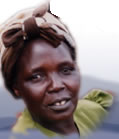 |
 |
||
 |
|||
|
RELATED THEMES development environment gender OTHER LOCAL THEMES BACKGROUND |
health
Women continue to give birth in the home, only going to hospital if there are complications. Modern medicine is clearly welcomed in the fight against more serious illnesses. But the high cost of treatment is a major cause for concern and poor roads make access to the area's limited facilities even more difficult. Use of traditional cures, which have the advantage of being less costly and locally available, has not completely died out. Few narrators mention HIV/AIDS, which probably reflects social discomfort at open discussion of the topic. Though one narrator does say that previously acceptable levels of extra-marital affairs are frowned upon now because of the worry of HIV/AIDS. The illness is seen to be related to what one narrator describes as "the immorality in the society right now", with many older people complaining about the promiscuity of youth today. Another health issue, and one that is now becoming more "visible", is disability. One narrator describes how in the past, disabled children kept in the house, away from view. Some parents would even abandon disabled offspring, it was seen as so shameful a matter. One mother told how when she gave birth to a disabled child, her in-laws and husband rejected her. Attitudes have been changing, though, due to outside influences and activities. When missionaries built some schools for the handicapped locally: "...it was then that we realised that so much could be done to alleviate the lives of our handicapped children". quotes about health"According to our culture, family planning issues were not supposed to be spoken about openly in a meeting. They were considered private and indecent." "On the positive part, we feel proud to be in Mount Elgon because we are not generally affected by malaria, though there is the element of highland malaria, which is highly pronounced. This happens seasonally, especially when the maize is flowering, because this can attract hideouts for mosquitoes, and the prevailing winds tend to blow towards the sides. So the maize and coffee plantations can be suitable places for mosquitoes to hide and breed. This subsequently causes malaria in people who have never been affected." ".the herbalist could be surviving because medical facilities are not easily accessible here. The high cost of modern medicine has also turned people away from them. You know that even original herbalists did not actually charge so much for their services. And usually a person paid after he had recovered. One would pay a cow, goat, sheep or even chicken if that herbalist wanted money. But they are still cheaper in comparison with the cost of modern medicine.But I feel that modern and traditional medicine are playing a complementary role." "...the Sabaot, to a great extent, are very lucky to be occupying this mountainous region, because in this area we don't have many diseases. Even a common disease like malaria is not very common in this area. But the few hospitals that we have somehow take care of the people, although I cannot say that we have adequate medical facilities. But previously Sabaot solely depended on herbal medicine. The disease that gave our herbalists the greatest challenge was smallpox, which wiped out nearly whole families. We are grateful that this disease is no longer here today. " "Another difficult thing in the past was when somebody broke a limb. This was a very difficult situation to handle. The general improvement of medical facilities has seen to it that diseases that used to afflict people in the past have been minimised. Presently the major scare in the community is the dreaded AIDS disease, for which seemingly no cure has been found. As parents, we are very much worried because of the immorality in the society right now, and we fear AIDS might wipe out whole communities." |
|